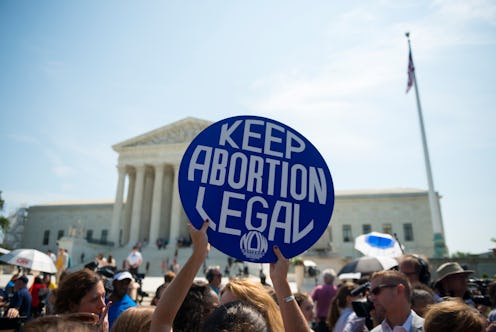News
What City Bans On Abortion Mean For Patients

Anti-choice legislators have tried to curtail abortion access from every possible angle over the last decade. Some of the most common have been gestational limits for abortion, or laws that regulate abortion providers out of existence. Over the last year, opponents of abortion access have started to pass local ordinances banning abortion to create what they call "sanctuaries for the unborn." This misleading legislation is causing confusion for the people who live there about whether abortion is still legal at all.
Cities in Utah, New Mexico, and Texas all created these so-called sanctuaries in the spring and summer of 2019. The trend attracted national attention in June 2019, when the all-male city council in Waksom, Texas, voted unanimously to ban abortion. In January, three more Texas cities passed local bans, bringing the total number in the state to 11. Fourteen more are considering them, according to an anti-choice website tracking the legislation. Some cities are even restricting access to emergency contraception like Plan B based on the myth that it causes abortions (it does not). None of the cities that have passed local bans so far even have abortion clinics, CNN reported in January.
To be clear: Roe v. Wade, which protects abortion access, is still the law throughout the U.S. Local bans like these, however, seek to chip away at Roe and add onto the state restrictions on abortion. In 2019, states enacted 58 new abortion restrictions; nearly half of those would ban all, most, or some abortions, according to the Guttmacher Institute, which researches abortion and reproductive health policy. More states are also passing restrictions on where people can access the abortion pill and even emergency contraception, making it hard for people to tell what's legal in their state at all. More than a dozen cases challenging Roe v. Wade are also winding their way through the federal court system. The Supreme Court will hear oral arguments in one, June Medical Services v. Russo, on Mar. 4.
Heidi Sieck, co-founder and CEO of #VOTEPROCHOICE, which works to elect pro-choice politicians, says local abortion bans are an example of how the anti-abortion movement is preparing for Roe v. Wade to be overturned. "The anti-choice movement knows that the likelihood that Roe could be overturned is very high," she says. If that happened, state law would determine whether abortion remains legal. If a state were to keep abortion legal, a local abortion ban would allow a city "to create anti-choice protection in a post-Roe environment."
Though the laws legally can't take effect while Roe still stands, they still impact people's access to abortion and other reproductive health care. "Folks will be very confused about whether they have access to any kind of reproductive health care in these cities," Sieck says. Many states also have different gestational limits for abortion, and some require mandatory counseling and waiting periods, which add barriers to people seeking abortions. "It's really a very confusing situation at the federal and state level," Sieck says.
Kamyon Conner, executive director of the Texas Equal Access Fund, which provides funding to low-income people who can't afford an abortion, estimates that calls to their help line have tripled as more local abortion bans have passed. The TEA Fund serves north Texas, including the part of the state where more "sanctuaries for the unborn" have cropped up. "These bans are making people look for where they can get access or whether or not [abortion] is illegal," Conner says.
She says that one of the TEA Fund's social workers who spent time in an abortion clinic in north Texas met people who thought they might be accessing abortion illegally. Conner says the social worker's experience speaks to the confusion the local bans can create. She stresses that "abortion is a necessary procedure and that people are going to be trying to get it no matter what."
Conner also highlighted how extreme the local bans and proposals are, calling them "a waste of resources." She'd like to see cities like Dallas and other municipalities use that money to focus on increasing access to health care including abortion. In September 2019, Austin's city council approved $150,000 to help people access abortion by paying for childcare and transportation. Thirteen states in the U.S. also have laws that protect abortion access in the event that Roe is overturned.
Conner noted that Texas has already spent a lot of money defending extreme abortion laws. State records show that Texas' legal battles over its abortion restrictions have cost taxpayers in the state $5.6 million, The Houston Chronicle reported. "These city councils should stop playing politics and inventing controversy and focus on issues that we elected them to handle," she says.
Sieck says she's hopeful that the local bans will at least alert people to the "amount of control that these elected officials are trying to exert over their bodies," as the 2020 election season begins. "[The bans] are just scaring more people, providing more barriers, providing more confusion."